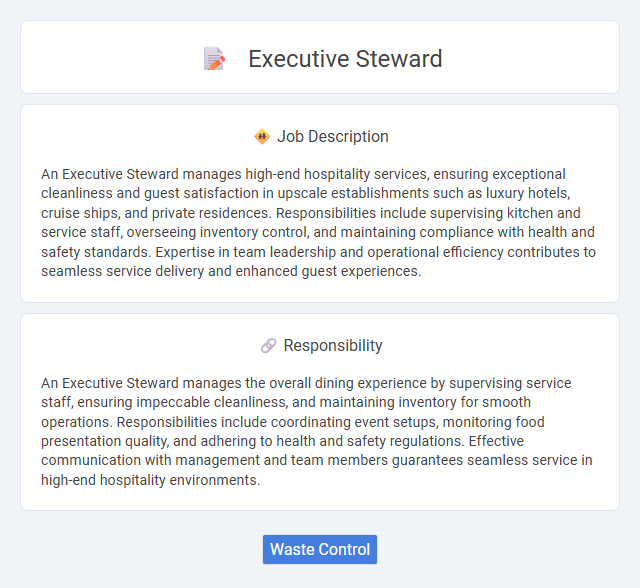
An Executive Steward manages high-end hospitality services, ensuring exceptional cleanliness and guest satisfaction in upscale establishments such as luxury hotels, cruise ships, and private residences. Responsibilities include supervising kitchen and service staff, overseeing inventory control, and maintaining compliance with health and safety standards. Expertise in team leadership and operational efficiency contributes to seamless service delivery and enhanced guest experiences.
Individuals with strong organizational skills and attention to detail are likely to thrive as executive stewards, given the job's demand for managing high-end hospitality services. Those who excel under pressure and possess excellent interpersonal abilities may find the role well-suited to their strengths. Conversely, candidates who struggle with multitasking or maintaining composure in fast-paced environments might face challenges in this position.
Qualification
Executive steward positions require candidates to possess exceptional organizational and interpersonal skills, with a minimum of 3-5 years of experience in hospitality or food service management. Key qualifications include expertise in inventory control, staff supervision, and adherence to safety and sanitation standards, often supported by certifications such as ServSafe or HACCP. Proficiency in communication, problem-solving, and leadership is essential to efficiently manage dining operations and ensure guest satisfaction.
Responsibility
An Executive Steward manages the overall dining experience by supervising service staff, ensuring impeccable cleanliness, and maintaining inventory for smooth operations. Responsibilities include coordinating event setups, monitoring food presentation quality, and adhering to health and safety regulations. Effective communication with management and team members guarantees seamless service in high-end hospitality environments.
Benefit
An executive steward role likely offers substantial benefits such as competitive salaries and comprehensive health insurance plans. Employees in this position may also receive opportunities for career advancement and skill development within the hospitality or service industry. Access to employee discounts and a supportive work environment could further enhance job satisfaction and retention.
Challenge
The executive steward role likely involves managing high-pressure environments where attention to detail and exceptional organizational skills are crucial for success. Challenges may include coordinating complex event logistics while maintaining impeccable service standards to meet executive expectations. Balancing the demands of a dynamic schedule with the need for discreet and efficient operation is often a key difficulty encountered.
Career Advancement
An Executive Steward manages high-level hospitality services, ensuring seamless dining and event experiences within luxury establishments, such as hotels and private clubs. Mastery in inventory control, staff coordination, and quality assurance positions professionals for advancement into senior management roles like Food and Beverage Director or Operations Manager. Developing strong leadership skills and industry certifications amplifies career growth opportunities in the hospitality sector.
Key Terms
Waste Control
An Executive Steward specializing in waste control manages and monitors waste disposal processes to ensure compliance with environmental regulations and sustainability goals. Responsibilities include implementing efficient waste segregation systems, conducting regular audits to minimize hazardous and non-hazardous waste, and coordinating with vendors for proper recycling and disposal. Expertise in waste reduction strategies and knowledge of local waste management laws are essential for optimizing operational costs and enhancing environmental stewardship.
 kuljobs.com
kuljobs.com